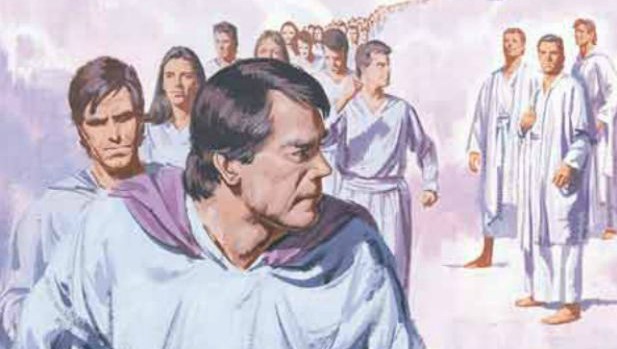Question
Gramps,
Where in the scriptures or modern day teachings does it explain that there is no progression between kingdoms? For example, at judgment if a person is in the Terrestrial Kingdom can this person advance to the Celestial Kingdom?
Nathan
Answer
Nathan,
I’ll start with a cold hard fact: Final judgment is final. That is tough for some people to accept. But it’s the truth.
Who has talked about this? Multiple prophets have declared it so. And Elder Bruce R McConkie has declared the progression between kingdoms doctrine to be one of “The Seven Deadly Heresies.” The primary established doctrine that supports this is that our resurrected bodies are of a certain type.
There are some people who have supposed that if we are quickened telestial bodies that eventually, throughout the ages of eternity, we will continue to progress until we will find our place in the celestial kingdom, but the Scriptures and the revelations of God have said that those who are quickened telestial bodies cannot come where God and Christ Dwell, worlds without end. –George Albert Smith (Conference Report, Oct 1945, p 172 – referring to D&C 76:112) emphasis added.
We learn that the bodies in which we are resurrected determine where we are to remain for eternity. The bodies themselves do not grow or evolve or increase in glory beyond the kingdom to which they are assigned.
After a person has been assigned to this place in the kingdom, either in the telestial, the terrestrial or the celestial, or to his exaltation, he will never advance from the assigned glory to another glory. That is eternal! –Spencer W. Kimball (Miracle of Forgiveness pp 243-244)
It is from these revelations which recite that resurrected beings come forth with different kinds of bodies [D&C 76; D&C 88:16-33; 1 Cor 15:35-58] that we learn a few of the many revealed reasons why there is not and cannot be progression from one degree of glory to another after the resurrection. –Bruce R. McConkie (Doctrinal New Testament Commentary 1: 196)
It has been asked if it is possible for one who inherits the telestial glory to advance in time to the celestial glory.
The answer to this question is, NO!
The scriptures are clear on this point. (D&C 76:112).
Nothwithstanding this statement, those who do not comprehend the word of the Lord argue that while this is true, that they cannot go where God is “worlds without end,” yet in time they will get where God was, but he will have gone on to other Heights. –Joseph Fielding Smith (Doctrines of Salvation 2:31
Beyond it being a false belief it is a dangerous belief.
This is worse than false! It is an evil and pernicious doctrine…. It causes them to say: “God is so merciful; surely he will save us all eventually. If we do not gain the celestial kingdom now, eventually we will, so why worry?” It lets people live a life of sin here and now with the hope that they will be saved eventually.
The true doctrine is that all men will be resurrected, but they will come forth in the resurrection with different kinds of bodies… The body we receive in the resurrection determines the glory we receive in the kingdoms that are prepared. –Bruce R. McConkie (The Seven Deadly Heresies; BYU, 1 June 1980)
You see, Nathan, the primary reason some would want to hold onto this false belief is no different than those described in Nephi’s prophecy of the last days.
7 Yea, and there shall be many which shall say: Eat, drink, and be merry, for tomorrow we die; and it shall be well with us.
8 And there shall also be many which shall say: Eat, drink, and be merry; nevertheless, fear God—he will justify in committing a little sin; yea, lie a little, take the advantage of one because of his words, dig a pit for thy neighbor; there is no harm in this; and do all these things, for tomorrow we die; and if it so be that we are guilty, God will beat us with a few stripes, and at last we shall be saved in the kingdom of God.
9 Yea, and there shall be many which shall teach after this manner, false and vain and foolish doctrines, and shall be puffed up in their hearts, and shall seek deep to hide their counsels from the Lord; and their works shall be in the dark.
10 And the blood of the saints shall cry from the ground against them. —2 Nephi 28:7-10
He prophesied that such false doctrines would abound in the last days. That the devil would rage in the hearts of men. How often do we realize that such doctrines can creep into the Church of Jesus Christ? This is why we need to listen to the words of the prophets rather than the words of our neighbors when determining truth from error.
We have established the fact that it is a false doctrine. We’ve shown the applicable scriptures. And we’ve provided the interpretation of modern prophets. These were doctrinal declarations during official public addresses and General Conference itself. Then they were repeated in the published works of the individual authors. But those thoughts and doctrines were repeated from scripture and from the official sources as well.
Now, many who cry about the mercy of God who still deny that this is a false doctrine may wonder “why would a merciful God condemn someone for all eternity based on so short a life as we have on this earth?”
My first question to them would be: How long a time would you want? Any finite amount of time is brief when comparing to eternity. So, how long is long enough? The Lord already tried giving us longer lifespans before the flood. That didn’t work out so well. He explained to us that our longer lives simply gave us more time to do more evil. I’d say it was an act of mercy to shorten our lives so that we didn’t fall into that trap for being among mortals too long.
The next thing I’d say is that the final judgment isn’t merely about what we did in as few years we were here, but about who we were.
Ye cannot say, when ye are brought to that awful crisis, that I will repent, that I will return to my God. Nay, ye cannot say this; for that same spirit which doth possess your bodies at the time that ye go out of this life, that same spirit will have power to possess your body in that eternal world. —Alma 34:34
By the end of this life we have a certain spirit that defines who we are. The differences in the three kingdoms are those who don’t really want to do good works, but will do so if forced; those who are willing to do good works – as long as it doesn’t take too much effort, and those who continuously seek out ways to do more good works as agents unto themselves. This trait is not one that changes after the resurrection.
Knowledge may be learned. Understanding may be obtained. But the attitudes and motivations of the spirit upon resurrection with regard to obedience to God do not change. That is why progression simply will not be possible no matter how God set things up. He will never remove our agency. It is we who are preventing our own progression, not God.
So, take the time to repent as often as possible. Choose the right, and do what is right. And when you don’t, repent again and start over. Press forward with a steadfastness in Christ. Love God and love your neighbor. Be valiant in your testimony of Christ. And feast upon the words of Christ to guide you along life’s journey. And in all things follow the Lord and listen to the voice of the Holy Ghost.
Gramps







